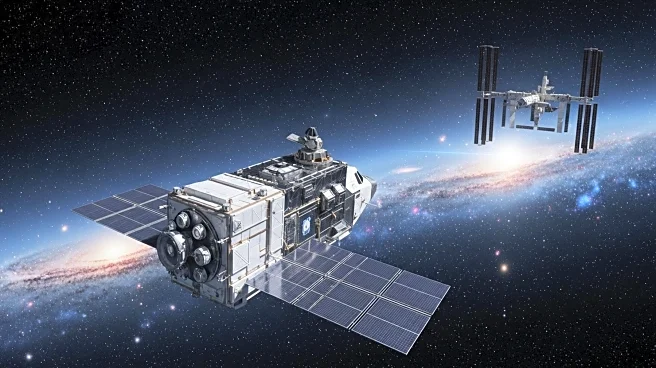What's Happening?
Russia has launched the Progress 93 cargo spacecraft towards the International Space Station (ISS) on September 11, 2025. The spacecraft, loaded with 2.8 tons of cargo, is scheduled to dock with the ISS on September 13, 2025. The launch took place from the Baikonur Cosmodrome in Kazakhstan at 11:54 a.m. EDT. The cargo includes food, propellant, and other supplies for the astronauts of the current Expedition 73 mission. NASA is providing live coverage of the event, which will continue through the docking process. The Progress 93 spacecraft will remain docked with the ISS for approximately six months before departing with astronaut trash, which will burn up in Earth's atmosphere.
Why It's Important?
The successful launch and docking of the Progress 93 spacecraft are crucial for maintaining the supply chain to the ISS, ensuring that astronauts have the necessary resources to continue their mission. This operation highlights the ongoing international collaboration in space exploration, with Russia playing a key role in supporting the ISS. The delivery of essential supplies helps sustain the scientific research conducted aboard the ISS, which has implications for advancements in technology, medicine, and understanding of space environments. The mission also underscores the importance of reliable logistics in space operations, which are vital for the safety and productivity of astronauts.
What's Next?
Following the Progress 93 mission, another cargo spacecraft, Northrup Grumman's Cygnus, is scheduled to launch atop a SpaceX Falcon 9 rocket on September 14, 2025. This upcoming launch will further support the ISS by delivering additional supplies. The continued scheduling of cargo missions reflects the ongoing commitment to maintaining the ISS as a hub for international scientific research. Stakeholders, including NASA and international space agencies, will continue to monitor these missions to ensure the seamless operation of the ISS and the safety of its crew.
Beyond the Headlines
The Progress 93 mission exemplifies the logistical challenges and technological advancements required for sustained human presence in space. It also highlights the environmental considerations of space missions, as the spacecraft will eventually burn up in Earth's atmosphere, minimizing space debris. The collaboration between different countries in space exploration fosters diplomatic relations and shared scientific goals, contributing to global efforts in space research and technology development.











